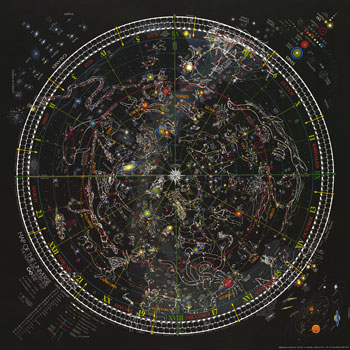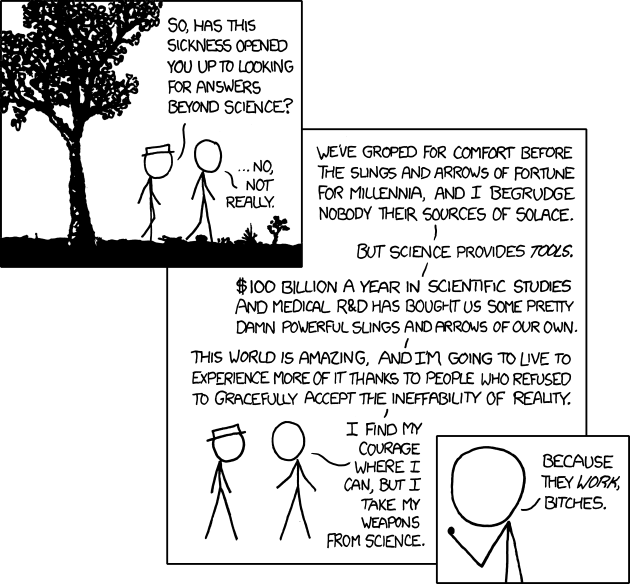The Nature of the Universe
Questions

Okay, let's begin.
- What can we possibly mean by "the nature of things" or the "nature of the universe"?
- Why would we possibly care?
- What does the word "nature" mean in this context?
- What exactly is the universe? Is it everything? Is it just one of many universes?
- How big is the universe? How many dimensions does it have?
- Did the universe have a beginning? Does it even matter?
- If it did begin, where did it come from?
- Will the universe end? What does that even mean? Should we care?
- What is time? What is space?
- How do we discover the nature of things? Where do we look?
- How do we know if we are right about what we discover?
- How do we know anything at all?
- Is there stuff we can't see or sense at all? If so, how do we know it's there?
- Why is there something instead of nothing? Can there even be nothing?
- What is real? Are you real? Am I real?
- Why are we here? What is our purpose? How should we live?
Notice that these are called “Questions” and not “Great Questions.”
We should not regard as great the questions that have been invented solely for the sake of eliciting puzzlement. — Peter Atkins
Explorations
Others have considered these questions before, and continue to do so today. What did they find out? How did they reason?
A lot of what has been discovered, what is known, and what is hypothesized, is captured in Wikipedia, the Stanford Encyclopedia of Philosophy, books, journals, audio and video recordings, and many other places.
Let's start by looking at works intended for a general audience because these do a good job of framing the questions and summarizing our current knowledge (and lack of knowledge), as well as provide histories of philosophy and science. Once comfortable with these issues, you can dive in to original sources and modern scholarly works.
Content for a Popular Audience
How about an introduction to the universe, from a physical perspective, followed by some more details on space and time? It's hard to get at what everything is without considering space and time.
- Michio Kaku's The Universe in a Nutshell
- The Spacetime section at thebigview.com has a collection of relatively short pages on relativity, time dilation, spacetime, quantum theory, the Uncertainty Principle, and the universe.
- A couple videos on relativity and quantum mechanics by Eugene Khutoryansky:
- Brian Greene's Fabric of the Cosmos, a four-part NOVA documentary series, first aired in 2011. Watch it at pbs.org.
- Greene's older NOVA documentary, The Elegant Universe, from 2003.
How big is the universe? How big or small are the things in it?
- Cary and Michael Huang's Scale of the Universe, an interactive exploration of the structures of the universe at various scales.
- Here is the interactive version
It's not just the things and the stuff of the universe that matters, but also their organization and behavior. Emergnce is the science of how seemingly complex behaviors in nature such as flocks of birds, ant colonies, schools of fish, life, consciousness, societies of people, and many other things, simply emerge without there being any recognizable leader. Here are some resources:
- Wikipedia article
- Video from Kurzgesagt
- Examples form NOVA Science Now
- Video from Quanta Magazine
- A Robert Sapolsky lecture on Emergence
And finally, might it be that the nature of things depends on observers? That is, us? If so, what do we know about ourselves, our brains, our minds, reality, consciousness?
- And... there are some great TED talks on the universe, physics, cosmology, and the human condition. And tons of short videos on bigthink as well. Happy searching!
Original Works
The following are noteworthy for various reasons:
- Euclid, Elements.
- Isaac Newton, Philosophiae Naturalis Principia Mathematica.
- Charles Darwin, On the Origin of Species.
- Works by Albert Einstein, which you can find at the Einstein
Papers Project or at
Wikipedia.
Four good ones are:
- On a heuristic point of view concerning the production and transformation of light (1905)
- On the electrodynamics of moving bodies (1905)
- Does the inertia of a body depend on its energy content? (1905)
- On the general theory of relativity (1915)
Answers?
Where might our answers come from? Science? Mysticism? Religion?
Science
The term "science" can mean a few things, but Wikpedia's opening line is pretty good:
Science ... is a systematic enterprise that builds and organizes knowledge in the form of testable explanations and predictions about the universe.
Testable explanations and predictions. They could have added careful observations, too.
You can get some information about science from the Wikipedia article and hundreds of thousands of other sources, including this transcript of one of Feynman's talks, which closes with the money line:
Science alone of all the subjects contains within itself the lesson of the danger of belief in the infallibility of the greatest teachers of the preceding generation.
Pretty important. Science has built into it organized skepticism that comes from a preference for theories that can in principle be falsified through repeated experimentation. Science "advances" both from people making better measurements and increasing our confidence in existing theories, as well as those that come up with (radically) new explanations.
Regardless of what is said about science, there is something very compelling about it, namely that it works. From Tyson and Goldsmith's Origins:
If you board an aircraft built according to science—with principles that have survived numerous attempts to prove them wrong—you have a far better chance of reaching your destination than you do in an aircraft constructed by the rules of Vedic astrology.
Randall Munroe popularized the phrase "Science: It works, bitches".
(He also used "science" as the answer to the question "What’s the worst thing that can happen in a pressure cooker?")
Science helps us ask the right questions, motivated by curiosity, says Neil deGrasse Tyson's in answering questions from readers of TIME:
Science is important, argues, Steven Pinker in his New Republic article attacking "scientism" because:
...the acquisition of knowledge is hard. The world does not go out of its way to reveal its workings, and even if it did, our minds are prone to illusions, fallacies, and superstitions. Most of the traditional causes of belief — faith, revelation, dogma, authority, charisma, conventional wisdom, the invigorating glow of subjective certainty — are generators of error and should be dismissed as sources of knowledge. To understand the world, we must cultivate workarounds for our cognitive limitations, including skepticism, open debate, formal precision, and empirical tests, often requiring feats of ingenuity. Any movement that calls itself “scientific” but fails to nurture opportunities for the falsification of its own beliefs (most obviously when it murders or imprisons the people who disagree with it) is not a scientific movement.
Religion
"Religion" is a hard term to define, but Wikipedia's introduction is good enough for our purposes:Religion is an organized collection of beliefs, cultural systems, and world views that relate humanity to an order of existence. Many religions have narratives, symbols, and sacred histories that are intended to explain the meaning of life and/or to explain the origin of life or the Universe. From their beliefs about the cosmos and human nature, people derive morality, ethics, religious laws or a preferred lifestyle. According to some estimates, there are roughly 4,200 religions in the world.
Many religions may have organized behaviors, clergy, a definition of what constitutes adherence or membership, holy places, and scriptures. The practice of a religion may also include rituals, sermons, commemoration or veneration of a deity, gods or goddesses, sacrifices, festivals, feasts, trance, initiations, funerary services, matrimonial services, meditation, prayer, music, art, dance, public service or other aspects of human culture. Religions may also contain mythology.
The word religion is sometimes used interchangeably with faith, belief system or sometimes set of duties; however, in the words of Émile Durkheim, religion differs from private belief in that it is "something eminently social". A global 2012 poll reports that 59% of the world's population is religious, and 36% are not religious.
So according to Wikipedia at least, religions that offer explanations of the origin of life or the origin of the universe or the meaning of life do so through "narrative, symbols, traditions, and sacred histories." And keep in mind, not all religions care about cosmic origins, nor do all religions care about morality. Religions are social.
Wikipedia also has a small collection of definitions of the term "religion."
So does that mean religion is useless in the study of the nature of the universe? Partially, BUT: Many great scientists have been members, and in fact clergy, of religious institutions. And many religious institutions have wholeheartedly supported scientific inquiry.
Here’s 72 minute video covering how religion might be defined, where it comes from, components of religions, how people “do” religion, and much much more:
Mysticism
"Mysticism" is another term that's hard to define. Basically, it's more about connecting with or experience a kind of being or consciousness "beyond normal human perception" — so says Wikipedia.
So mysticism isn't necessarily about answering the questions above; however, it can be cool. Oh and note: mysticism can be religious or non-religious.
But what does it mean to be "beyond normal human perception"? If we can perceive it, then we can measure and study it? Or can we? What do you make of the following?

The Meaning of Life, Wonder, and Awe
What can we say about the meaning (or the purpose?) of our existence? How is it related to our sense of wonder or of awe?
- Neil Tyson on knowledge of the cosmos (and a few other things):
- Carl Sagan's famous quote "Some part of our being knows this is where we came from. We long to return.
And we can. Because the cosmos is also within us. We're made of star-stuff. We are a way for the
cosmos to know itself."
Also see the Wikiquote page on Sagan.
- Also check out Sagan's Pale Blue Dot. Several people have put his words in this work to video; there a quite of few of these on youtube.
- From The Feynman Series: Science adds to the beauty we can perceive:
- And more from Feynman: The truth is so much more remarkable than the stories made up by people who didn't know:
- Jason Silva has a number of similar videos. He has one entitled The Biological Advantage of Being Awestruck.
- Kevin Simler has a small blog called Spirituality of Science that "celebrates science and wonder." Perhaps there are a few entries of interest.
Methods of Inquiry
What tools do we have in our search for answers? We have the three pillars of scientific inquiry:
- Theory
- Experimentation
- Computation
Computation is a (relatively) recent addition to this list. The powerful computation available to us today makes available to us knowledge that we could never simply observe with our eyes or work out with pencil-and-paper mathematical reasoning: it is qualitatively different that what we could know before. See Chapter 7 of the book Science at the Frontier, as well as Peter Denning's Great Principles of Computing for more.
Summary
We’ve covered:
- Questions one may ask in pondering the nature of the universe
- A bit about the universe, space, and time as packaged for a popular audience
- Sources of questions and answers
- Wonder and awe
- Methods of inquiry
